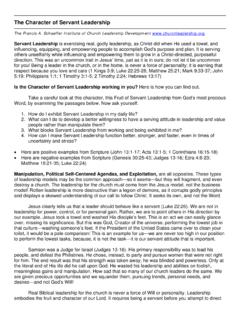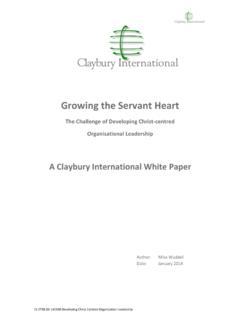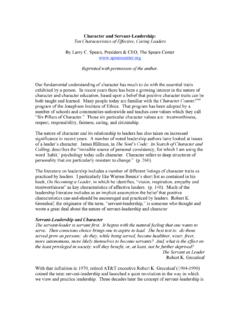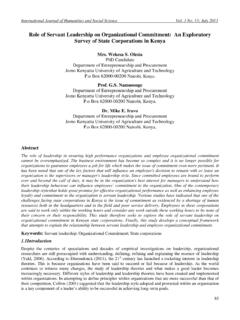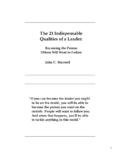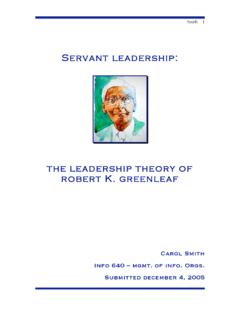Transcription of THE ETHICAL ADVANTAGE OF SERVANT LEADERSHIP By Dr. …
1 THE ETHICAL ADVANTAGE OF SERVANT LEADERSHIP By Dr. Kent M. Keith CEO, Greenleaf Centre for SERVANT LEADERSHIP (Asia) Copyright Kent M. Keith 2014 Most of us are shocked when a leader public, private, or non-profit behaves unethically. We should be shocked. The ETHICAL behavior of leaders has a significant impact on the ETHICAL behavior of others in their organizations. Our leaders must set a good example, not a bad one, because the repercussions are significant. The desire for ETHICAL leaders People all over the world want their leaders to be ETHICAL . LEADERSHIP experts James Kouzes and Barry Posner asked 75,000 people around the world what they look for and admire in a leader. The top-ranked characteristic over a twenty-year period was honesty. People want to follow someone who is truthful, ETHICAL , and principled. Recent research conducted by a team from the University of Illinois at Chicago among employees in Singapore generated similar results.
2 More than 400 employees from ten different educational, healthcare, non-profit, and training organizations were asked to rate the behavior of their supervisors. They were given seven specific behaviors to rate: Creating value for the community, conceptual skills, emotional healing, empowering, helping followers grow and succeed, putting followers first, and behaving ethically. While all seven behaviours received positive ratings, the behaviour that was most desired by the employees was behaving ethically. Unfortunately, the biggest gap between current supervisor behaviour and desired behaviour was also behaving ethically. The Singapore employees who were surveyed want their supervisors to be more ETHICAL . LEADERSHIP theories without ethics That makes sense. But it gives rise to another question: Where and how do leaders learn to lead ethically? They can learn about values, virtues, and good character from their families, their faiths, and their schools.
3 But when it comes to learning about LEADERSHIP itself, they may not learn 2 anything at all about ethics. The surprising fact is that many ideas or theories of LEADERSHIP do not include ethics. They are about skills or techniques designed to get other people to do things. These skills or techniques can be used for good or ill. For example, Bernard Bass, a leading scholar regarding transformational LEADERSHIP , argued that transformational leaders could be either heroes or villains. Both Gandhi and Hitler would qualify. Other scholars note that while a lot of research has focused on LEADERSHIP , little research has been focused on LEADERSHIP ethics. SERVANT LEADERSHIP embeds ethics Fortunately, there is an idea about LEADERSHIP that embeds ETHICAL considerations, and that is SERVANT LEADERSHIP . LEADERSHIP scholars have concluded that one of the elements that distinguishes SERVANT LEADERSHIP from other LEADERSHIP theories is the moral element.
4 SERVANT -leaders demonstrate personal morality and integrity, and encourage enhanced moral reasoning among their colleagues. In addition, the ETHICAL behavior of SERVANT -leaders is embedded in four operating principles that guide them in their daily decision-making. The four principles are: 1. Serve people. 2. Help people grow. 3. Exercise foresight. 4. Care about everyone the organization touches. These principles are not only ETHICAL , they are also effective, because they support high performance and exceptional organizational results. For SERVANT -leaders, it is not a choice between ethics and success. SERVANT -leaders know that their ETHICAL behavior enhances their organization s success. Serve people First, SERVANT -leaders serve people. Serving others is ETHICAL because it is respectful of the needs of others, and is an effort to treat people right by helping to meet their needs. Serving others is also effective.
5 When SERVANT -leaders identify and meet the needs of their colleagues, their colleagues can perform at higher levels. When SERVANT -leaders identify and meet the needs 3 of their customers, their customers are happy and are likely to come back and tell their friends. Grow people Second, SERVANT -leaders help people to grow. This respects each individual s potential and recognizes the importance of personal growth to job satisfaction. It is also a key to organizational success. In almost every organization today, people are the most important resource. When people grow, their capacity grows. When their capacity grows, the capacity of the organization grows. When the capacity of the organization grows, the organization can better serve its customers. Individuals benefit, the organization benefits, and customers benefit. Exercise foresight Third, SERVANT leaders exercise foresight. Foresight requires the use of information and intuition to identify new trends and events that can shape the future.
6 A leader who does not exercise foresight may fail to adapt to change, and may get his or her organization into trouble, hurting many people along the way. Robert Greenleaf, who launched the modern SERVANT LEADERSHIP movement, said that foresight is the central ethic of LEADERSHIP . That s because foresight is central to the future existence of the organization and its ability to meet its obligations. Care about everyone the organization touches Fourth, SERVANT -leaders care about everyone their organization touches employees, customers, business partners, lenders, shareholders, and communities. Organizations impact many people. The only ETHICAL stance is to care about all of them, and to make the impact on them as favorable as possible. It is not surprising to find SERVANT -leaders and their organizations participating in the corporate social responsibility movement that began twenty years ago. Business leaders from around the world developed the Caux Round Table principles of business ethics in 1994, recognizing the importance of treating all stakeholders fairly.
7 4 In 2000, the United Nations launched the Global Compact, a program that is designed to encourage businesses to adopt sustainable and socially responsible policies, and to report on their implementation. Businesses that sign the compact agree to abide by ten principles in the areas of human rights, labour, the environment, and anti-corruption. Today there are over 10,000 corporate participants and other stakeholders from over 145 countries the largest voluntary corporate responsibility initiative in the world. Here in Singapore, corporate social responsibility is promoted by the Singapore Compact, established in 2005. Today it has 400 members focused on the triple bottom line profit, people, and planet. The idea is that a multi-stakeholder approach for mutual benefit can result in doing well and doing good. Businesses can be competitive and innovative, creating quality jobs, products, services, and wealth. At the same time, they can devote time and resources to making their businesses socially responsible and sustainable.
8 This helps them to attract and retain motivated and committed employees, achieve resource efficiencies, reduce risks, and win and retain consumers and business customers. Scholarly research supports the effectiveness of caring about all stakeholders. Scholars from Arizona State University conducted a study of 126 CEOs of high tech firms in Silicon Valley. They found that the returns on investment were higher for firms whose CEOs were SERVANT -leaders who took into account a broader number of stakeholders. Based on his own research, Dr. Dirk van Dierendonck, a LEADERSHIP scholar at Erasmus University in the Netherlands, has suggested that paying attention to all stakeholders is the key to long-term profits. SERVANT -leaders focus on serving people, growing people, looking ahead for the benefit of people, and paying attention to the needs of all stakeholders. These principles are not only ETHICAL , they are effective. If we want to improve both the ethics and the performance of our organizations, we need to be modeling and teaching SERVANT LEADERSHIP to our current and future leaders.
9 +++ This article was originally published in The Straits Times (Singapore) in two parts on January 22 and 23, 2014.
